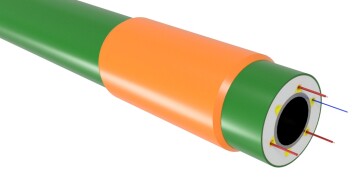TotalEnergies, Equinor, Aker BP, DeepOcean, Tenaris, and LS Cable & System are collaborating in a joint industry project (JIP) to pilot test a novel subsea flowline heating technology they developed to deploy independently of the pipeline itself, potentially cutting manufacturing and installation costs as well as carbon emissions by a third.
The Oslo-headquartered DeepOcean subsea services company leads the project with funding from The Research Council of Norway to run pilot tests on the technology with the aim of validating system performance under real operating conditions.
The patented design, referred to as FlowHeat (Fig. 1), allows cables to be installed after the pipeline is laid; as an alternative, cables can be installed into a reeled pipeline, DeepOcean reported in a news release on 21 October.

The system’s “key advantages include reduced topside weight, lower power consumption, and less complex installation,” Andries Ferla, DeepOcean’s technology director and project owner, said. “The cable is also repairable and enables real-time monitoring via optical fiber.”
FlowHeat can be deployed in 3000 m water depth for distances of up to 30 km or possibly up to 50 km after a pipeline is laid, DeepOcean said in its release. The technology allows smaller remotely operated vehicles to install heating systems in cold, deepwater environments where wax, hydrates, and long pipeline distances may hamper flow.
Successful Thermal Trials
Initial small-scale and thermal trials already have proven successful, according to the release. Tests have demonstrated reliable cable installation across obstacles and longer distances, as well as high electrical efficiency with low topside power demand. The technology can be deployed from all vessel types.
“After a very important phase progressing from idea to proof of concept, TotalEnergies is very enthusiastic to enter in a full-scale validation with this group of highly skilled specialists for qualification of the technology,” said Florent Boemare, research manager for offshore solutions and technology at TotalEnergies, who has been part of the development since the beginning of the project.
“Together, we believe we can unlock longer tiebacks and access to remote reserves,” Boemare added.
The system can cut carbon emissions by up to 30% by reducing the number of days per installation and by using smaller vessels. Costs are also 35% less than traditional technologies, DeepOcean said.
Deepwater Market Potential
The market potential for FlowHeat targets the Norwegian Continental Shelf, Brazil, the US, Africa, and other deepwater markets where more than 300 electric heating projects have been identified as possible by 2030.
Complementary resources within the JIP participants include:
- DeepOcean—Project owner and global subsea services provider, responsible for research, engineering, and project management, DeepOcean will optimize cable installation processes and deliver value through innovation and subsea integration.
- Tenaris—Producer of specialized coating solutions with expertise in the development of innovative flow assurance solutions, its end-to-end thermal insulation coating technologies extend pipeline lifetime and reduce operating and maintenance costs for flowlines of any length.
- LS Cable & System—A global power and communications cable comany supplying advanced products such as submarine, extra-high-voltage, superconducting, and fiber-optic cables, LSC&S offers global reach and technical expertise essential for long-distance subsea heating.
- TotalEnergies, Equinor, Aker BP—The industry operators will bring critical domain knowledge, infrastructure, investment capacity, and research and development initiatives to validate and deploy FlowHeat in real-world applications.

